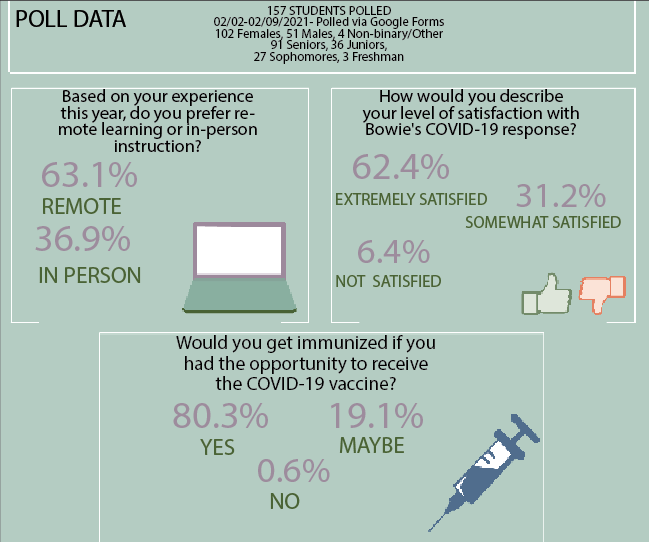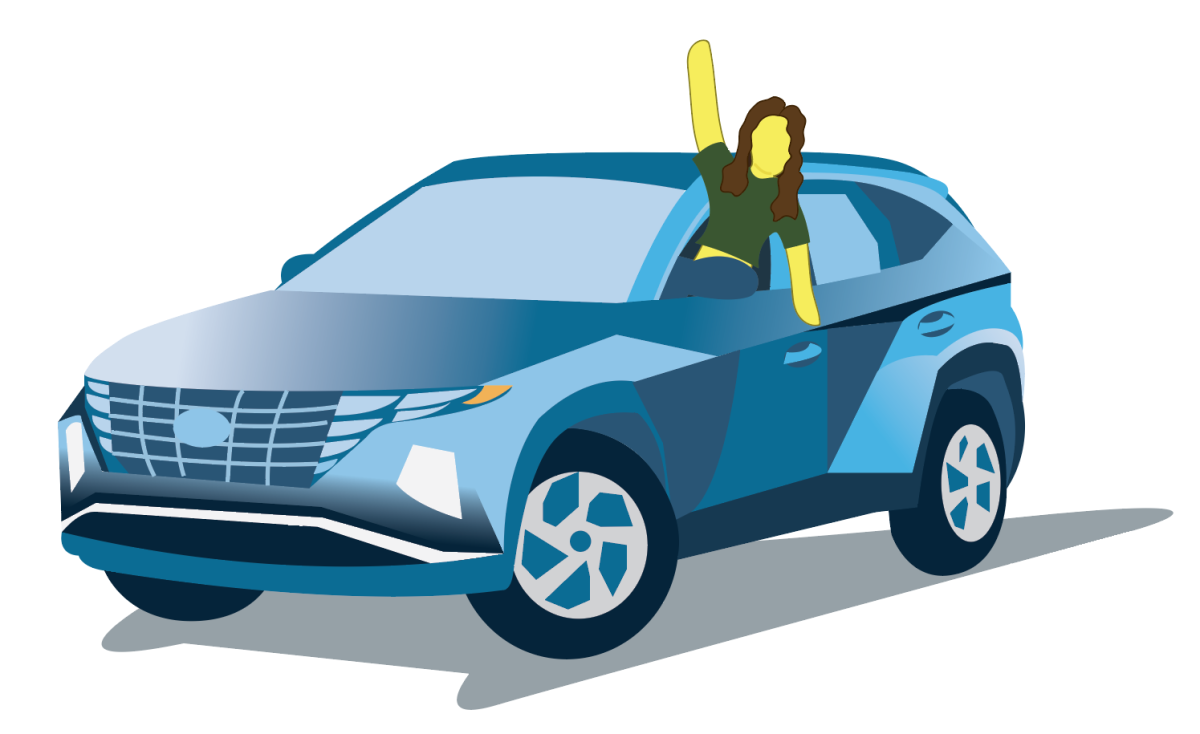COVID-19 vaccine distribution initiated
The first vaccine was administered to a health care worker on Dec. 14, 2020. However, almost two months later, the cases are still rising with over 26.3 million cases and almost 500,000 deaths.
April 5, 2021
Since the outbreak of COVID-19 in December of 2019, several companies, including Moderna and Pfizer, have been working to distribute vaccines in order to protect American citizens from the Coronavirus. The first vaccine was administered to a health care worker on Dec. 14, 2020.
However, almost two months later, the cases are still rising with over 26.3 million cases and almost 500,000 deaths. Several people, including science teacher Jessica Davis, believe that even with the vaccine, it will not be the end of COVID-19.
“With the new variants emerging and vaccine distribution challenges, we are projected to lose many more lives over the next few months,” Davis said. “I also worry that people that can get vaccinated may not, and that keeps people who are unable to receive vaccines at greater risk.”
Along with the lives lost this year, this pandemic has brought change in different forms, including the change to a virtual model of school. Although this year has been online for a majority of Bowie students, some students have been going back in person, including sophomore Antony Ramirez.
“My school experience with COVID-19 has been a bit challenging because learning from home is a bit difficult and in person it’s quite risky,” Ramirez said. “Going to campus has been okay actually but it does feel awkward going to the library sometimes.”
With students going back on campus, there have also been numerous COVID-19 cases reported from Austin Independent School District (AISD) staff members and students. According to the AISD’s COVID-19 tracker, there have been 1,091 cumulative positive cases with 623 employees and 444 students since Sept. 2020.
“I am content with how Bowie has been responding to COVID-19,” senior Megan Zeng said. “They have been informing me about any new cases that happen at Bowie through emails.”
Ascension Seton Medical Care is working with AISD to get all staff members the COVID-19 vaccine at the earliest date. The district has split up the staff members into multiple groups; currently staff members who are over the age of 65 or at risk have been getting the vaccine and once those individuals get them, the district will move on to the next group of higher risk individuals to be vaccinated.
“While this year has certainly presented challenges, the vaccine distribution roll-out is a reason to be hopeful,” Assistant Principal Marie Prescott said. “I am confident that at Bowie we are keeping student and staff safety front and center, while also providing a quality learning environment.”
The vaccination process with Seton is part of a larger program called the AISD Pilot Program, a program that works with staff members in order to ensure that students receive high quality instruction from certified teachers. The school was named just one of five schools to work in the program to help better the conditions of COVID-19 and remote learning.
“Bowie staff is involved in the pilot program at a whole-campus level to support students and teachers in maximizing student learning and student and staff safety,” Prescott said. “These measures help to reduce the spread of COVID-19.”
The pilot program works with Education Austin and AISD to help connect district leaders to the AISD employees in order to work together and address general concerns about COVID-19 and students’ needs.
“The program was designed to help our most at-risk faculty and staff work remotely, while still providing access to highly qualified teachers for in-person students whose teacher may be working from home,” Davis said. “It took the cooperation and innovation of teachers and administrators to make this work, and we are so proud of our campus for working together to make this happen.”
The CDC (Centers for Disease Control and Prevention) has authorized and recommended individuals to get either the Pfizer-BioNTech or the Moderna vaccine. As of Dec. 28, the AstraZeneca vaccine, Janssen’s vaccine, and Novavax’s vaccine are all currently working in Stage 3 of the COVID-19 vaccine clinical process. Senior Cristian Garcia Pena is hopeful that the vaccination will be successful.
“There have been an extraneous amount of disparities in the distribution of vaccines, but I think Austin would not experience that,” Garcia Pena said. “I am sure the vaccines will be available to us before the beginning of next school year.”
According to Pfizer data published in Dec. 2020, the Pfizer vaccine is roughly 52% effective after the first dose for adults. However, Dr. Jose Romero, the chair of the CDC’s Advisory Committee, said that testing trials for COVID-19 vaccines in children under the age of 18 should begin mid-2021.
“I plan on getting the vaccine when it becomes available because I think that it’s important for me to protect myself as well as protect others near me,” Zeng said.
Davis believes that once a majority of Americans get vaccinated, there will be a change in the COVID-19 situation for the better.
“The goal is to vaccinate enough people that the vulnerable populations who have medical reasons that prevent them from receiving vaccinations will be protected,” Davis said. “Hopefully between vaccines and building some natural immunity, it will become more like the seasonal flu, where we receive vaccinations for the predominant strains each year and try to keep the spread as low as possible.”
Garcia Pena believes that after most Bowie staff members and students get vaccinated, life will get back to normal, except for the continued use of masks in the public.
“There would be a majority of students who [would take the vaccine], so I do not think there would not be a need for masks. However, if wearing the mask was required, I would respect that,” Garcia Pena said.
Many Bowie students are concerned about the transition away from COVID-19 as more people are being vaccinated. Zeng believes that after the vaccination process there will still be some changes in the perspective of “normal.”
“I think that everyone will return in a new normalcy way because I would still be hesitant to go back without a mask, since there can be new mutations of the virus,” Zeng said.
Some Bowie teachers have incorporated the COVID-19 vaccine into their lessons in class, including Davis. In her AP Biology class, Davis created a project where students brainstormed solutions to make formal proposals for an equitable vaccine distribution globally. After seeing their work, Davis is hopeful towards the future, even with the global pandemic.
“I am proud of our students’ response to the challenges the COVID-19 pandemic has presented us with and after seeing their projects, I am excited and hopeful for our future,” Davis said. “We have some amazing future scientists and public health professionals in our current student body.”







